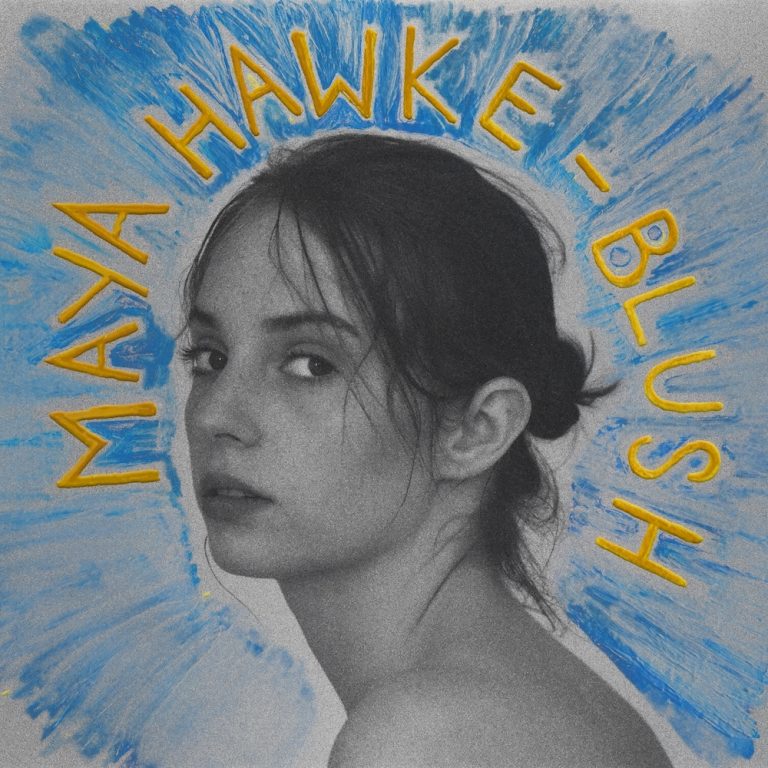In the world of artistic legacies, there seems to be a constant contention about whether to embrace nepotism or run away from it. Francis Ford Coppola’s daughter Sofia followed her father into filmmaking, even after a disastrous acting turn in his own Godfather 3; his nephew Nicolas Kim Coppola took the other option, adopting the stage name Nicolas Cage so as not to influence casting directors. In music, it’s still surprising to remember that the indie-pop singer Frankie Cosmos’ parents are actors Kevin Cline and Phoebe Cates and that she wasn’t born in Brooklyn already fully-formed as the hipster lo-fi artist that she is today.
So we have the newest example in Maya Hawke – daughter of iconic actors Uma Thurman and Ethan Hawke – releasing her debut music album Blush, not attempting to hide where she came from (although one wonders whether the album’s title is perhaps a reference to some unconscious embarrassment about her rich roots). Hawke herself will be familiar to most through her recent role as Robin in Netflix’s Stranger Things, and it was during downtime on acting sets where she first turned to the pursuit of music.
It’s certainly not unfair to contend with Hawke’s privileged position. It’s how she secured a Vanity Fair interview despite only performing publicly for the first time a few months ago. It’s how the collaboration with noted songwriter and producer Jesse Harris initially materialised, after he scored her father’s film The Hottest State. It’s also how someone like Norah Jones came to play contemplative piano on “Bringing Me Down” (she and Harris worked together on a string of albums in the 2000s). This would all be prime accusatory material with which to tarnish Hawke if the resultant record was of poor quality, but Blush is, in its gentle and pleasant way, a strong debut collection of country and folk songs.
Hawke has delivered an understated and unrushed exploration of matters of love and maturation; she wrote every song herself and her approach is straightforward and open, as one would expect given that much of it was penned during lovelorn teenage years. There is a clear connection between current Hawke and her past selves, stretching back to childhood. The opening song “Generous Heart”, for example, was written while Hawke was still a senior in high school and contains understandably earnest and endearing lyrics like, “I have nothing to say about love anymore / Love is nothing, I am yours.”
It would perhaps be better to call this the work of a duo, for Harris’ imprint is indelible on the album. A long-time lover of poetry, Hawke took her poetic creations to Harris who then put her words to music. His bluesy electric guitar carries the mild lyricism of “So Long” and powers the resounding “Menace”; his gracious production doesn’t attempt to interfere with Hawke’s light and plaintive vocals too much either.
Their quietly successful combination invites the listener in, involving them in the intimacy, and there’s no hint of entitlement in their welcoming whispers. “Hold The Sun” feels like the most evocative example of the musician version of Hawke as she currently stands. The acoustic instrumentation is withdrawn, her rasping and enveloping vocal drifting to the fore, singing the soothing lullaby lines.
Her poetic sense is best exemplified on a track like the meandering “By Myself”; the four personal verses each finish with Hawke undergoing a different activity, the verb altered: “And I’m playing with myself… And I’m talking to myself… And I’m dreaming of myself… And I’m beating up myself.” “River Like You” displays an emotional self-awareness borne by hindsight, Hawke contending “I’ve loved a river like you before / If only I were wise / I never learned to turn and run / When I saw the water rise”; the buoyant breeze of recalls the brighter work of Laura Marling, who is a clear touchstone.
There are naive missteps, as is to be expected. The swagger and stomp of “Animal Enough” feels extraneous to the rest of the record, Hawke’s voice unable to fulfil the necessary raucousness. The whole endeavour threatens to become too cute with the appearance of two of Hawke’s younger sisters as a youthful backing chorus on “Cricket”.
Of the two famous parents, Ethan’s mark is more felt. Hawke admitted that her love of music was instilled by her father (Ethan starred in a 2015 film about his idol Chet Baker, for instance). He’s explicitly acknowledged on the sweet track “Goodbye Rocketship”, a song Hawke wrote as a teenager to get out of trouble that contains the intelligent and thoughtful line “You didn’t know how to raise me any more than I knew how to grow up.”
Closing song “Mirth” was the last song recorded for the album and is the only one Hawke played and wrote entirely alone. The lovelorn and yearning narrative finds her considering whether it’s a person or New York itself that she misses and needs. This is Hawke’s music style as it stands: cosy and unthreatening, feeling for its place in the world. If she is to continue in this artistic mode, wonderful lines like “I’d hold you like soft water / Holds the sun against the sky” offer hope that she can open up her range a little more to match the words moving forward.

